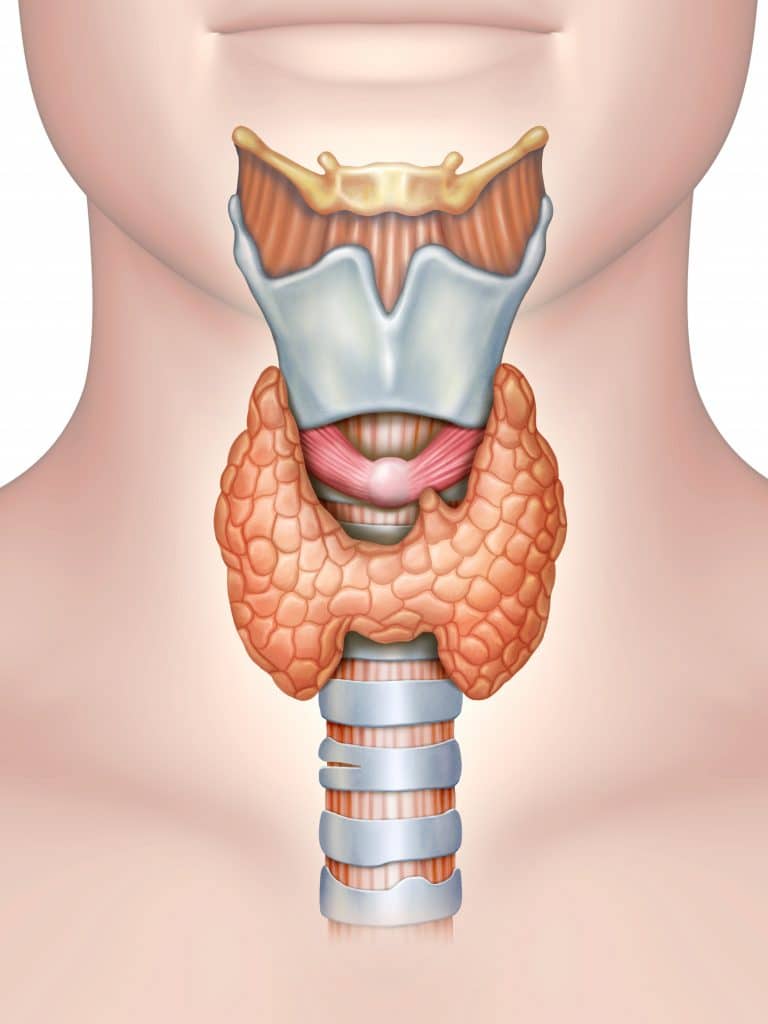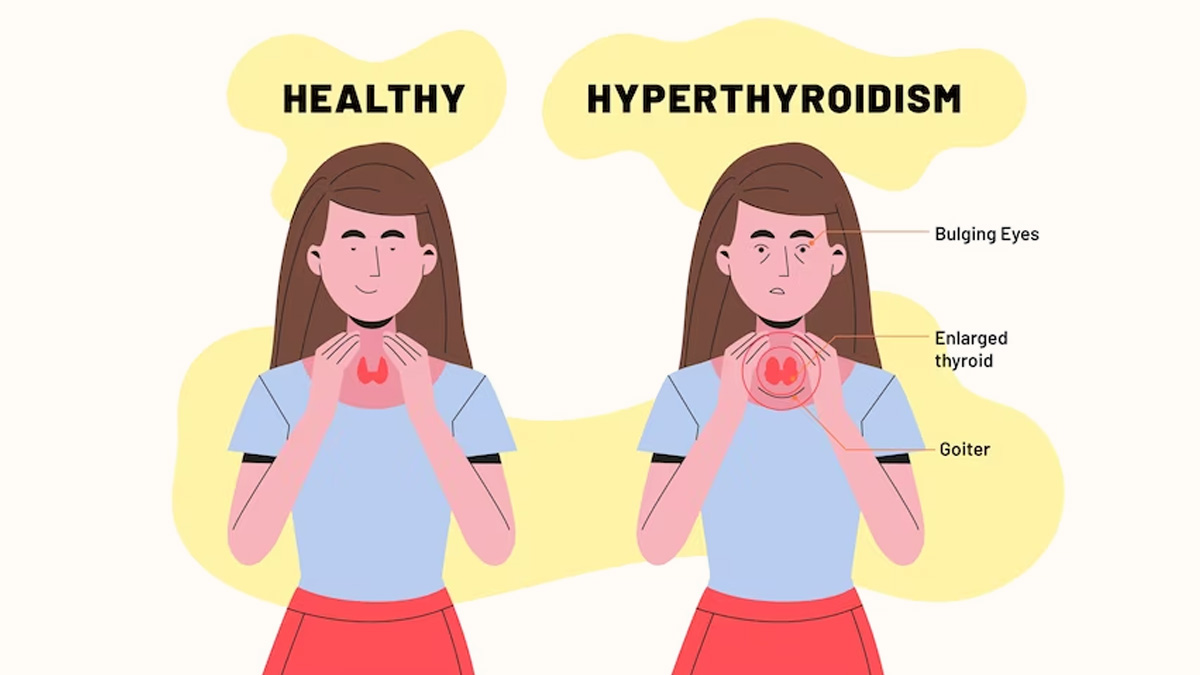Importance of Thyroid Hormone
The thyroid is a butterfly-shaped gland located in the front of your neck, just below your Adam’s apple. It’s part of your endocrine system, which is a network of glands that make hormones that travel through your bloodstream and impact many parts of your body.
The thyroid’s main function is to produce hormones that regulate your metabolism, the rate at which your body converts food into energy. Thyroid hormones influence almost every cell and organ in your body and play a role in many essential functions, including:

- Heart rate
- Breathing
- Weight
- Body temperature
- Muscle strength
- Mood
- Brain development
- Bone growth
There isn’t really different types of thyroid glands, but there are different conditions that can affect the thyroid. These conditions can cause the thyroid to malfunction and not produce the right amount of hormones.
Here are two main types of thyroid conditions:
Hyperthyroidism
This occurs when the thyroid gland produces too much thyroid hormone. This can cause weight loss, anxiety, trouble sleeping, and an irregular heartbeat.
This occurs when the thyroid gland doesn’t produce enough thyroid hormone. This can lead to fatigue, weight gain, feeling cold, and difficulty concentrating.
Importance of Thyroid Hormone | There are other conditions that can affect the thyroid gland, such as
- Goiter: This is an enlargement of the thyroid gland. It can be caused by a number of things, including iodine deficiency, Hashimoto’s thyroiditis, and Graves’ disease.
- Thyroid nodules: These are lumps that form in the thyroid gland. They can be benign (noncancerous) or malignant (cancerous).
- Thyroiditis: This is an inflammation of the thyroid gland. It can be caused by a virus, bacteria, or autoimmune disease.
- Thyroid cancer: This is a rare type of cancer that develops in the thyroid gland.
Here’s a more detailed breakdown of the thyroid and its functions:
- Structure: The thyroid is a butterfly-shaped gland that sits low in your neck, just below your Adam’s apple. It’s made up of two lobes connected by a thin bridge of tissue.
- Hormone production: The thyroid gland produces two main hormones: triiodothyronine (T3) and thyroxine (T4). T4 is the main hormone produced by the thyroid gland, and it’s converted into T3 in the body’s tissues.
- Regulation: The production of thyroid hormones is regulated by a complex feedback loop involving the hypothalamus, a tiny region at the base of the brain, and the pituitary gland, a pea-sized gland located just below the hypothalamus. The hypothalamus produces a hormone called thyrotropin-releasing hormone (TRH), which stimulates the pituitary gland to release thyroid-stimulating hormone (TSH). TSH travels through the bloodstream to the thyroid gland, signaling it to produce T4.
If your thyroid hormone levels become too low, the hypothalamus and pituitary gland will increase TSH production to stimulate the thyroid to produce more hormone. Conversely, if your thyroid hormone levels become too high, the hypothalamus and pituitary gland will decrease TSH production to slow down hormone production.
-
Thyroid hormones play a vital role in many bodily functions, including:
- Metabolism: Thyroid hormones regulate your body’s metabolic rate, which is the rate at which your body converts food into energy.
- Growth and development: Thyroid hormones are essential for normal growth and development, particularly for children and adolescents.
- Brain function: Thyroid hormones are crucial for brain development and function.
- Heart rate and blood pressure: Thyroid hormones help regulate your heart rate and blood pressure.
- Body temperature: Thyroid hormones help regulate your body temperature.
- Muscle strength: Thyroid hormones play a role in muscle strength and endurance.
- Mood and mental health: Thyroid hormones can affect your mood and mental health.
- Weight management: Thyroid hormones help regulate your weight by controlling your metabolism.
- Skin and hair: Thyroid hormones can affect the health of your skin and hair.
- Menstrual cycle and fertility: Thyroid hormones can affect your menstrual cycle and fertility.
Importance of Nutrition
Thyroid conditions because everyone’s needs are different. However, focusing on a well-rounded, nutritious diet can greatly benefit people with thyroid issues. Here’s what to keep in mind:
- Nutritious whole foods: Focus on incorporating plenty of fruits, vegetables, whole grains, and lean protein sources. These foods provide essential vitamins, minerals, and fiber that support overall health and well-being.
- Iodine: Iodine is crucial for thyroid hormone production. Include iodine-rich foods in your diet like dairy products, iodized salt, saltwater fish, seaweed, and eggs. However, too much iodine can also be problematic, so consult your doctor about the right amount for you.
- Selenium and zinc: These minerals play a role in thyroid function. Brazil nuts, seafood, whole grains, and legumes are good sources of selenium, while oysters, beef, lamb, chickpeas, and nuts are rich in zinc.
- Fiber: Fiber helps with digestion and can be beneficial for managing weight, a common concern with thyroid conditions. Fruits, vegetables, and whole grains are all good sources of fiber.
Here are some additional points to consider:
- Goitrogenic foods: Certain vegetables like broccoli, kale, and cauliflower contain goitrogens, which can interfere with thyroid function. However, the effect is usually only significant in people with severe iodine deficiency or existing thyroid problems. Cooking these vegetables can also reduce the goitrogenic effect.
- Gluten sensitivity: Some people with Hashimoto’s thyroiditis, an autoimmune disease that attacks the thyroid, may also have gluten sensitivity. If you suspect gluten sensitivity, discuss it with your doctor and consider a gluten-free diet if recommended.
Remember, it’s important to consult with your doctor or a registered dietitian before making any major changes to your diet, especially if you have an underlying thyroid condition. They can help create a personalized plan that addresses your specific needs and ensures you’re getting the right nutrients.
Sample Diet Chart for Thyroid Patients
Important Note: This is a sample chart and may not be suitable for everyone. It’s crucial to consult a registered dietitian or healthcare professional for a personalized diet plan based on your specific thyroid condition (hypothyroidism or hyperthyroidism) and calorie needs.
| Meal | Sample Options | Nutrients |
|---|---|---|
| Breakfast | – Greek yogurt with berries and chia seeds
– Scrambled eggs with spinach and whole-wheat toast – Oatmeal with nuts and banana |
Protein, Fiber, Vitamins, Minerals |
| Mid-Morning Snack | – Apple slices with almond butter
– Carrot sticks with hummus – Handful of mixed nuts |
Fiber, Healthy Fats, Vitamins, Minerals |
| Lunch | – Grilled salmon with roasted vegetables and brown rice
– Chicken salad sandwich on whole-wheat bread with avocado slices – Lentil soup with a side salad |
Protein, Fiber, Healthy Fats, Vitamins, Minerals |
| Afternoon Snack | – Cottage cheese with pineapple chunks
– Edamame pods – Sliced bell peppers with guacamole |
Protein, Fiber, Vitamins, Minerals |
| Dinner | – Baked cod with roasted sweet potato and broccoli
– Turkey chili with a side of quinoa – Vegetarian stir-fry with tofu and brown rice |
Protein, Fiber, Vitamins, Minerals |
| Evening Snack | – Small portion of berries with unsweetened yogurt
– Herbal tea |
Vitamins, Minerals |
Foods to Emphasize:
- Fruits and Vegetables: Aim for a variety of colors for a range of vitamins and minerals.
- Whole Grains: Choose brown rice, quinoa, whole-wheat bread/pasta for fiber and sustained energy.
- Lean Protein: Include fish, chicken, turkey, beans, lentils, tofu for building and repairing tissues.
- Healthy Fats: Nuts, seeds, avocado, olive oil for satiety and nutrient absorption.
- Selenium-Rich Foods: Brazil nuts, tuna, eggs, mushrooms can support thyroid function.
Foods to Limit:
- Processed foods: Often high in sodium, unhealthy fats, and can interfere with thyroid medication absorption.
- Sugary drinks: Can contribute to weight gain and disrupt blood sugar levels.
- Goitrogenic vegetables (if consuming large amounts): Cruciferous vegetables like broccoli, cauliflower, cabbage may interfere with thyroid function in some individuals. Consult your doctor for specific guidance.
Remember, consistency is key. By following a balanced diet rich in essential nutrients, you can support your overall health and well-being while managing your thyroid condition.

